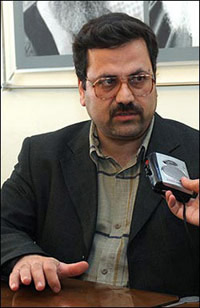Rationalization of Oral History Books (part II)
Rationalization Represents the Mastery of Compiler over Text
Akram Dashtban
Translated by: Fazel Shirzad
2018-5-29
Note: Following report is based on an invitation in which history experts are asked questions about oral history. In this regard, one of experts, as his perspective, has answered to one of questions titled "The amount of rationalization and appendix in oral history books". We'll read these comments as follows.
Mohammad Javad Moradinia, general director of Office for the Development of Books and Reading Books of the Ministry of Culture and Islamic Guidance and the director of Oral History Two-Quarterly, commented oral history site of Iran about rationalization of oral history's texts.

He spoke about the amount of rationalization and appendix in oral history books: As title showed, rationalization is an introduction of names, places, historical phenomena, the name of book, and so on, which is ambiguous to addressee, and compiler bring explanation, based on valid documentation and references, in the footnotes of book.
Moradinia continues to state that there is no different between definition of rationalization in oral memory and oral history, and added: Although this two formats are distinct in definition, author uses the technique of rationalization in the compilation of work when s/he encounter with ambiguous and unknown terms.
Saying about functions of rationalization, he added: The rationalization of text shows that the compiler of book has mastered on it and has worked hard to make the text a useful and effective one. Otherwise, it eliminates the ambiguities of text and converts a work from an early to polished one, and becomes closer to a research work.
The director of Oral History Two-Quarterly said about weak points that threatens rationalization of oral history: If a text selected for rationalization is not documented or ambiguous, it will add disadvantages to book. It is not supposed to make topics more obscure by rationalization in book. If compiler has encountered with a name in narration and cannot explain it well or does not have a reliable explanation for information which he provided, s/he only adds to shortcomings of effect.
The proper extraction of content is related to interviewer, if interviewer submits subject in ambiguous or summary terms, this is the art of interviewer to keep interview climate, hold the dialogue, then ask questions and take answers and rationalized text. It is not necessarily supposed that rationalization and explanations are brought in the text only compiler.
Moradinia explained about the amount of rationalization: The amount of rationalization should be concise and useful and should not overcome the text; a line, for example, should not be explained in twenty lines. This is the art of author and compiler to state readers, what they intended, with minimal words and sentences and does not exceed its limits.
Iranian oral history website asks question to experts about oral history, and publish responses to readers. Total responses will have remarkable results. If you have any questions, please feel free to submit it via this page to read comments from experts of oral history!
Number of Visits: 5368








The latest
- Pathology of Oral History Education in Iran
- Third Regiment: Memoirs of an Iraqi Prisoner of War Doctor – 18
- Practical Models for Simulating Texts in Distinguished, Signature Styles, Under the Use of AI Tools in Resistance Literature
- A Recollection by Ali Tahiri of a Military maneuver
- 100 Questions/17
- Third Regiment: Memoirs of an Iraqi Prisoner of War Doctor – 17
- Oral History News of December-January 2026
- Analyzing the Impact of Sacred Defense Memories on the New Generation: Usage in Transmitting Values
Most visited
- Oral History News of December-January 2026
- The Sha‘baniyya Uprising as Narrated by Ali Tahiri
- Analyzing the Impact of Sacred Defense Memories on the New Generation: Usage in Transmitting Values
- 100 Questions/16
- Third Regiment: Memoirs of an Iraqi Prisoner of War Doctor – 17
- Practical Models for Simulating Texts in Distinguished, Signature Styles, Under the Use of AI Tools in Resistance Literature
- 100 Questions/17
- A Recollection by Ali Tahiri of a Military maneuver
100 Questions/13
We asked several researchers and activists in the field of oral history to express their views on oral history questions. The names of each participant are listed at the beginning of their answers, and the text of all answers will be published on this portal by the end of the week. The goal of this project is to open new doors to an issue and promote scientific discussions in the field of oral history.Oral History of 40 Years
One of the main hypotheses regarding the reason for the growth and expansion of oral history in the modern era relates to the fact that oral history is the best tool for addressing lesser-known topics of contemporary history. Topics that, particularly because little information is available about them, have received less attention.Omissions in the Editing of Oral History
After the completion of interview sessions, the original recordings are archived, the interviews are transcribed, proofread, and re-listened to. If the material possesses the qualities required for publication in the form of an article or a book, the editing process must begin. In general, understanding a verbatim transcription of an interview is often not straightforward and requires editing so that it may be transformed into a fluent, well-documented text that is easy to comprehend.100 Questions/8
We asked several researchers and activists in the field of oral history to express their views on oral history questions. The names of each participant are listed at the beginning of their answers, and the text of all answers will be published on this portal by the end of the week. The goal of this project is to open new doors to an issue and promote scientific discussions in the field of oral history.

